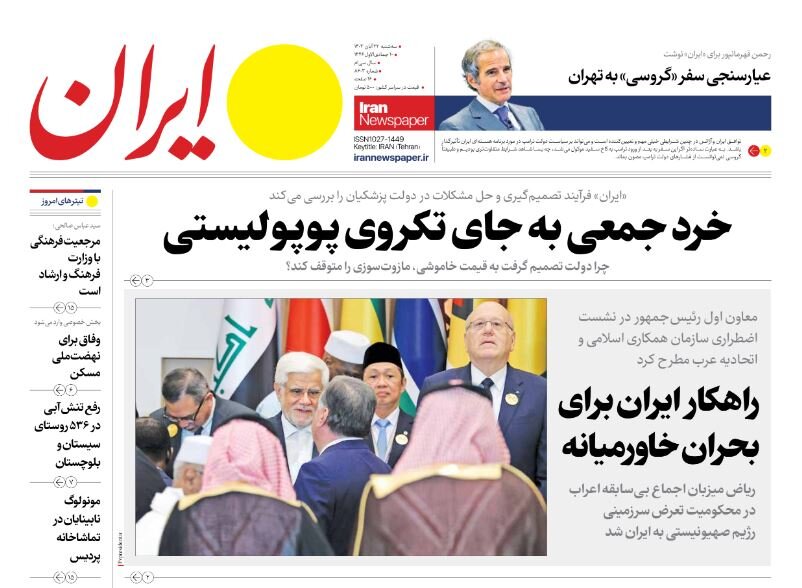Seaoriented development is revived
Sea-oriented development is revived
TEHRAN - In an analysis, the Iran newspaper discussed the importance of sea-oriented development in the current government and wrote: Despite having a privileged geographical position, being located between two seas and having thousands of kilometers of beaches and of course islands and many capacities, Iran is not among the countries with strategic ports in the world.

The sea-oriented economy is one of the neglected capacities of the country. The countries opposed to Iran, being aware of our country’s strategic position, have put the national shipping fleet of our country under the most severe sanctions. However, for the development of trade in the sea, Pezeshkian proposed four important and urgent solutions, which are "strengthening the local economies of the region, providing the necessary infrastructure in the field of energy by relying on renewable energies, accelerating the completion of transportation corridors in the region with the cooperation of international partners, and attracting and concentrating on domestic and foreign investment in Makran ( a long strip along the coast of the Gulf of Oman).
Shargh: Iran and Trump
In a note, Shargh addressed the return of Trump to the White House and his possible policy towards Iran and said: There is no doubt that the conditions this time are much more difficult for Iran than the previous period (when Trump was president from 2017-2021). Also, it is important what the Trump team's policy about Iran and the Middle East is supposed to be. If the Trump administration intends to focus on great power competition, America's priority in the new era may be China and Russia. But, the alleged claim of “the "China-Russia-Iran-North Korea front" against the West may prove problematic. America may try to use Iran as a bargaining chip in its interactions or confrontation with China and Russia. In this case, these two countries will naturally consider their interests. China may be pressured to stop buying oil from Iran and Russia to stop military and security cooperation with Iran. Given these scenarios, one solution is to enter negotiations with the Trump administration at the same level and on the same topics as during the Biden administration.
Jam-e-Jam: Trump’s comeback and intensification of media war
In a commentary, Jam-e-Jam discussed the efforts by the Zionist regime's pro-war media to escalate tensions after the election of Trump as president. It wrote: The Zionist regime's pro-war media outlets are trying to link Trump's election with the tightening of sanctions, tougher negotiations or new measures by the United States against Iran's nuclear program, and the countries that are standing against the Zionist regime. These media outlets try to show that the decision-makers are thinking of a military option rather than a diplomatic approach. For this reason, they seek military views and analyses from all experts, even those specialized in sociological, political and international issues to influence public opinion in the world. They pretend that many believe that Trump's policies in the second term are likely to lean towards nationalist and unilateralist approaches, as Trump has promised to take tougher measures against Iran's nuclear program and to block Iran's access to financial resources by imposing heavier sanctions.
Arman-e-Melli: Convergence in Saudi Arabia
Peace in the region is one of the most important topics of any dialogue in the region, and the two large and influential countries of Iran and Saudi Arabia are the focus of any multilateral dialogue in West Asia. In the current situation, crises in the Middle East have increased to the extent that few analysts speak of peace and tranquility. Therefore, regional consultation centered on Iran and Saudi Arabia has become more important to achieve peace and tranquility. It seems that one of the most important security cases in the region, namely Israel's attack on Gaza and Lebanon, is on the agenda of the special meeting of the leaders of the Organization of Islamic Cooperation in Riyadh (which was held in Riyadh on Monday). Both Iran and Saudi Arabia are seeking to end conflicts in the region. Of course, they have different views on the Palestine issue. It seems that Iran and Saudi Arabia will put special emphasis on solving the Palestinian issue, and such meetings can send a single message from the region to the West and Israel that Israel's aggression against Gaza and Lebanon should be stopped as soon as possible.
source: tehrantimes.com